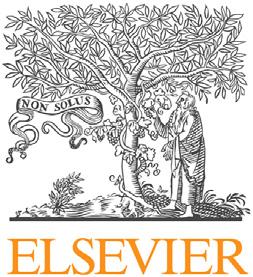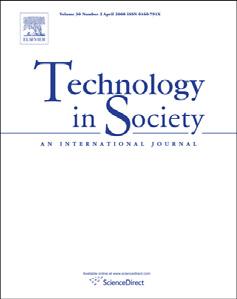
Editorial
Contentslistsavailableat ScienceDirect
TechnologyinSociety
journalhomepage: www.elsevier.com/locate/techsoc
ThepapersinthisSpecialIssueofTechnologyinSociety entitled, “TechnologicalFutures” explorethechangingrole oftechnologyintheearly21stcentury.Whilefocusingon specificaspectsofthediscourseandpracticeoftechnology, theyallaimatcontributingtotheideaof “epistemicstrategies” asananalyticaltooltobetterunderstandwhatis commonaboutthevariousmanifestationsoftechnological practiceandhowtechnologyasahumanenterpriserelates toandinfluencessociety,cultureandidentity.Theideafor thisSpecialIssueoriginatedatthesessiononTechnological FuturesintheWorldCongressofSociologyinGoteborg, Sweden,chairedbytheGuestEditorofthisSpecialIssue, GerardodelCerroSantamaría.Severalofthepapersinthis issuewerepresentedattheGoteborgsession.Othersjoined theprojectatalatertime.
Ourunderstandingoftheconceptof “epistemicstrategies” (relatedbutdistinctlydifferentfromtheideaof “epistemiccultures” asproposedbyKarinKnorrCetina) aimsathighlightingtheroleofagents(individualand collective)inmanagingknowledgeandinformationandin controllingtheinformationavailabletointeractingagents inthepracticeofscienceandtechnology.Whendealing withscienceandtechnologyinthe “networksociety”,the ideaofepistemicstrategyiscloselyassociatedtothe conceptof “meta-narrative” andtotheconstructionof metaphorsservingastranslatorsofsymboliccodesamong fieldsandsubfieldsoftechnologicalendeavors.
AccordingtoManuelCastells,thetechnologicalrevolutionofourtimes,centeredaroundinformation,isfundamentallyalteringthewayweareborn,welive,welearn, wework,weproduce,weconsume,wedream,we fight,or wedie.Evenbeyondinformation,recenttechno-scientific advancementshavedeeplychangedthewaysinwhich humanbeingsrelatewithbothnatureandsociety.Wecan projectafuturewheremoredecisionswillbemadebynonhumanentitiesandwheretechnologywillcontinue transformingourunderstandingofsocial,politicaland ethicalissues.
Therecenteconomiccrisisof2008andthepoliciesthat seektodealwithithavehaddistincteffectsonthepaceof technologicalinnovations.Ontheonehand,policymeasurestoovercomethecrisissuchasthereturnof
http://dx.doi.org/10.1016/j.techsoc.2014.10.001 0160-791X/© 2014ElsevierLtd.Allrightsreserved. TechnologyinSociety40(2015)1 3


KeynesianismandPresidentObama's “fourthway” of managingcapitalismbyincreasingpublicspendingprovidedapushtosometechnologicaladvancement.In Europe,noveltechnocraticformsofgoverninghavebeen implementedinordertodealwiththecrisis.Theresultsof theseapproachesarestillunknown.Yetregardlessofregionorpoliticalpreferences,social,politicalandtechnologicalinnovationsareseentobethekeytosolvingpresent andfutureproblems.Furthermore,thecrisishashindered thepaceofadvancementofothertechnologicalinnovationsandtransformedourunderstandingoftheinterrelationshipsbetweenenergy,capitalandinformation thatlieatthecoreofsocio-economicsystems.
ThisSpecialIssueofTechnologyinSocietydealswith majorareasthatdeeplyinfluenceknowledgeandresearch concerningpossibletechnologicalfuturesandtheirconsequencesforhumanandnaturalenvironments.Thepapersinthisissuefocusonnewandusefulepistemic strategiestoapproachtechnologicalissuesinanincreasinglytechno-scientificworld.Thepapersalsoseekto flesh outsomeofthesocialimpactsoftechnologicalfutures.
Theexponentialqualityoftechnologicaladvancement requiresustoaddresstheneedforrevisionofepistemic perspectives.Whatarethedistinctmethodologiesthat socialscientistshavetoputinplaceinordertoresearchthe complextechno-scientificscenarioloominginthehorizon? Whatarethepossibilitiesforcollaborationbetweentechnologistsandsocialscientistsduringresearchandpolicy prescription?Howdotechnologiesmodifyour Weltanschauung andaffectboththepublicspaceandthecorrespondingviewsonsocial,political,andeconomicissues?In addition,wemustnotforgetthatwewitnessnewermodalitiesofagencythataretechnologically-made.Asthe prospectisevermorepresentthatelectronicallyenabled teamsinnetworksandrobotswithartificialintelligence contributeto financial,health,educational,andevenpoliticaldecisionsforus,whataretheimplicationsforagency amidstthisnewglobalelectronicinterconnectedness?
Whataresomelikelyfuturescenariospertainingtothe impactoftechnologyinsocietyandtheepistemicstrategies thatarebestsuitedtograspsuchscenarios?Morespecifically,whatarethesignificantissuestoberaisedand
debatedabouttechnology'spowertoinfluencehumanand naturalenvironments?Ifweassumethatnon-humanentitiesareincreasinglymakingdecisionsforus,whatisthe placeforhumanbeingsandwhatarethephenomenologicalapproachesthatcouldhelpusunderstandsuchplace? Inaddition,howdoepistemictechnologiestravelfrom sciencetosocietyandwhatarethewaysinwhichtheyare sanctionedandvalidated?Regardingethicsandvalues, howarebiomedicalinnovationsappliedtohumanreproductionreshapingourconceptionsofautonomy,human dignityandequalrights?Howwillthepublicunderstand scienceandtechnologyastheseepistemologiespervade ourlives?Finally,whatisthepromiseofatransdisciplinary technologicalfutureforresearchandaction?Theseare someoftheresearchquestionsaddressedbythepapersin thisSpecialIssueonTechnologicalFutures.
1.Thecontributions
In “WhatisLeftforHumansinaTechnologically-made Life?RelevanceofN.Luhmann'sTheoryofSocialSystems” ElianaHerreraVeraexploresthepossibilityofa remainingspaceforhumanswithinatechnologicallymade societyandhowitispossibletoaddresscurrentproblems causedbytheencounterofecologicalboundariesbyboth humanactionandexpertsocialsystems.HerreraVera suggeststhatthedescriptionofasocietywithouthumans, asN.Luhmannposits,canbeusefultopreservethehuman space,inthemidstofaradicallydifferentnotionofalterity.
ThepaperbyCorneliusSchubert,entitled “Situating TechnologicalandSocietalFutures.PragmatistEngagementswithComputerSimulationsandSocialDynamics,” analyzeshowepistemictechnologiestravelfromscience intosociety.Theauthorarguesthatthisdiffusionisno simplecolonizationofsocietybyscientificinstruments. Rather,itismarkedbymanifoldtransformationsinthe waysinwhichthenumericpredictionsaresanctionedand validated.Thepaperofferstoexplainthesedynamics againstthebackgroundofpragmatistreasoningandconceptualworkdoneinscienceandtechnologystudies. Epistemicinstrumentsarenotseenasneutral,butas transformativeandgenerativeofsocietiespast,presentand future.
CatarinaDelaunay,in “TheBeginningofLifeatthe Laboratory:TheChallengesofaTechnologicalFuturefor HumanReproduction,” analysestheunderlyingprinciples andsocialconsequencesoftheincreasingdetachmentbetweenhumanreproductionandsexualityviatheprocessof technologicalinterventioninthebiologicalbody.Basedon thisempiricalresearch,Delaunaycontendsthatitis essentialtostudywhichvaluesthetechno-sciencesare actuallyredefining,therangeofsocialchoicestowards thesevaluesandtheconsequencesthesechoiceshave in termsofparenthoodrightsandfamilyties,forexample. Thepaperreflectsuponthesenewvaluesandepistemic strategiesandquestionswhethertheyarecompatibleor notwithdemocraticprinciplessuchasautonomy,human dignityorequalrights.
Usingthebroaderframeworkofscienceandtechnology studiesandinsightsfromsocialresearchonpublicunderstandingofscience,thepaperbyAndaAdamsone-
Fiskovica,titled “TechnoscientificFutures:PublicFraming ofScience” discussesspecificaspectsofthepublic perceptionofscienceandhowthesecontributetochanging epistemicstrategiesregardingscienceandtechnology.By meansofanalyzingpublicdiscoursesofignoranceaswell astheinterrelationsbetweendiscoursesof ‘science-ingeneral’ and ‘science-in-particular’ inthelaypeoplenarrative,thisstudyincludesresultsfromtwoempiricalcasesof future-orientedscience-relatedmatters,climatechange andbiomedicine(xenotransplantation).Theanalysisintroducesasetofmorespecificrhetoricaldevicesand epistemicstrategiesemployedbylaypeopleinreflectingon theroleofscienceandinprovidingtheirassessmentof moderntechno-scientificsolutions.
ThepaperbyGerardodelCerroSantamaría, “TransdisciplinaryTechnologicalFutures:AnEthnographic ResearchDialogueBetweenSocialScientistsandEngineers,” suggeststhattransdisciplinarityisrisingasa powerfulepistemicstrategyforresearchintechnologyrelated fieldssuchasengineering.Thoughthistopichas beenapproachedfromaphilosophicalperspective,we knowlittleabouttheactualshapethattransdisciplinarity mighttakeinresearchandaction.Howistransdisciplinarityoperationalizedinresearchandprofessional practice?Littleisknownabouttheshapingoftechnological futuresinvolvingcollaborationsbetweenengineersand socialscientists.Thispaperoutlinesaframeworkfor transdisciplinarycollaborationwhichisappliedtothe Robotics-for-Theaterproject,atransdisciplinaryproject madepossiblewithNSFfundinganddevelopedatThe CooperUnionfortheAdvancementofScienceandArtin NewYorkCity.
In “InformationTechnologyWithinSociety'sEvolution,” DaríoRodríguez,CarolinaBuscoandRodrigoFloresanalyze howcommunicationtechnologieshavehelpedtransform societyasawhole,asawayofstudyingtheimpactof technologyinsocietyanditspowertoinfluencehumanand naturalenvironments.Thispaperoffersananalysisbased ontheimpactthatcommunicationtechnologyhashadon socialdevelopmentovertime.Languageandwriting,asthe firstcommunicationaltechniqueshavebeenfollowedbya seriesoftechnologies,asprinting,telephone,radio,television,internetandcellphones,whicharenowadays smarterthanever.Thesenewtechnologieshaveincreased theamountofcommunications,makingworldsociety morecomplexthaneverandacceleratingsocialchanges. Thislastobservationintroducesthepossibilityofproposing thearrivalofanewera.
RadhamanySooryamoorthysuggeststhattheuseof technology(theInternetandemail)byscientistshasbeen instrumentalinestablishingscientificcollaboration.Inhis paper “InternetTechnologyandtheEpistemicStrategiesof ScientistsinPost-apartheidSouthAfrica:RaceasaDecisive Factor,” theauthorarguesthatthetechnologyofconnectivityanduseofitinscientificresearchisofimportancenot onlytotakeadvantageofthetechnologybutalsoto improveproductivity.Thishasimplicationsforthefutureof thetechnologyandhowitisusedbydifferentsegmentsof thescientificpopulation.Thisstudycoversacademicsand scientistsfromthesampledinstitutionsinSouthAfrica,and examineshowtheuseoftechnologybydifferentracial
categoriesaffectedtheircollaborativeresearchenterprise, professionalnetworksandproductivity.Itishopedthat studywillgiveinsightsintothefutureoftechnologyand theirusersintheemerginghighlyelectronicallycollaborativescientificsystem.
LindaDianeRussell,in “DemocratisingtheScientific Space:TheEmergingMetaphorofSociallyEmbeddedAutonomy,” offersadiscussionandanexplanationofthe evolutionofsocialmedianetworksandhowtheyare transformingnotonlythesocialbutthepoliticalandeconomicspace.Thispaperdrawsuponnewphilosophical currentsemergingaroundtheconceptof “situatedepistemologies” whichquestiontheepistemologicalfoundations oftraditionalWesternepistemicframeworks.Usingthese concepts,thispaperconsiderstheextenttowhichnew strategiesemergingfromdiscussionsconcerningwomen's epistemicspacemayalsoserveasaframeworkforthe epistemiclegitimizationofinitiativestodemocratizeand strengthenthehorizontaldimensionsofthescientific space.
ThepaperbyBinayPattnaik, “MobilizingfromAppropriateTechnologiestoSustainableTechnologiesbasedon GrassrootsInnovations,” offersacomprehensiveunderstandingoftheconceptofAppropriateTechnology(AT)and pointsoutitshistoricrelevancebothfromthestandpoints ofdevelopinganddevelopedcountries.Thepaperfocuses ontheevolutionofATmovementinIndiaandideological contributionsbyvariousthinkerslikeM.K.Gandhi,E.F. Schumacher,J.C.Kumarappa,andotherstothismovement. ItstressesthatATmovementasadiscursiveoneisnot aboutmobilizingactivitiesandpeoplebutisaboutacademicdiscoursesconcerningAT.Tosupportthiscontention,thepaperpresentsanempiricalcasestudyofasocial movementorganizationnamedHoneyBeeNetwork.The author'sdemonstrateinthiscasethattheoriginal
discourseoftheAThaschangedandnowrepresentsashift towardsustainabletechnologiesinIndia.
ThepapersinthisSpecialIssuedemonstratethatjustas thedynamicinterplaybetweenTechnologyandSocietyis rapidlychanging,similarlyourabilitytoconceptualizeand understandthisinterplaymustalsotransform.Theideaof “epistemicstrategies” isonecriticalanalyticaltoolenabling ustoexplorewithanarticulatedframeworkwhatiscommonaboutthevariousmanifestationsoftechnological practiceandhowtechnologyasahumanenterpriserelates toandinfluencessociety,cultureandidentity.Itisour visionthatthisSpecialIssuewillprovokefurtherdiscourse onthistopicenablingcontributorsto TechnologyandSociety todeepenscholarshipwithcontinuedapplicationof thistool.Theultimategoalof TechnologyinSocietyis to enabledeliberateandintentionaldecision-makinginthis areathatsodeeplyaffectsusall.Wehopethenewconcepts presentedinthisSpecialIssueandthediscourseitprovokeswillaidinachievingthisgoal.
GerardodelCerroSantamaría* HumanitiesandSocialSciences,TheCooperUnionforthe AdvancementofScienceandArt,41CooperSquare,NewYork NY,10003,UnitedStates CharlaGriffy-Brown PepperdineUniversity,CenterforTeachingandLearning Excellence,GraziadioSchoolofBusinessandManagement, 6100CenterDrive,LA90045,UnitedStates
Correspondingauthor. E-mailaddress: gdelcerro@gmail.com
Availableonline24November2014
